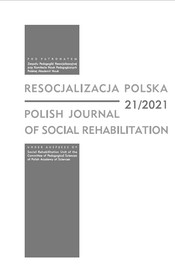Poczucie autodeterminacji u osadzonych odbywających karę pozbawienia wolności w wybranych systemach. Rola orientacji temporalnej oraz sprawności mechanizmów kontroli działania
Self-determination among inmates serving prison sentences in selected systems: the role of temporal orientation and self-control skills
Author(s): Romana Kadzikowska-Wrzosek, Ewa PiotrowskaSubject(s): Psychology of Self, Behaviorism, Penology
Published by: Fundacja Pedagogium
Keywords: the penalty of deprivation of liberty; theory of self-determination; temporal orientation; self-control;
Summary/Abstract: The aim of the research was to check the impact of the system of serving the sentence on a sense of self-determination of the convicts – the sense of control of ones’ own acts and taking responsibility for them (the system of a program impact and the ordinary system), the ability of self-control and temporal orientation. A correlation test was taken (N = 91; the ordinary system N = 54; the system of program impact N = 37). The sense of self-determination was tested by means of Emmons’ Personal Goals Survey (Emmons 1998), the ability of self-control was measured by Kuhl’s Acting Control Survey (ACS-90) in the Polish version of Marszał-Wiśniewska (2002) and temporal orientation was evaluated by Zimbardo Temporal Perspective Inventory (ZTPI) (Zimbardo and Boyd 2011) in the Polish version of Sobol-Kwapińska, Przepiórka and Zimbardo (2016). Contrary to the expectations, no vital impact of the system of serving the sentence on the sense of self-determination of convicts was found. The impact of future temporal prospect was demonstrated. The impact of the future temporal perspective proved to be irrelevant as well. However, the vital impact of ability to self-control and fatalistic impact orientation towards present time was confirmed. The low ability of self-control cause fatalistic orientation towards the present time which has, in turn, a negative impact on the sense of self- determination. The study results confirm that obtaining an important resocialization aim such as activation in the convict of a will to change by cultivation of subjectivity and perpetration, should to a large extent comprise the impact on such characteristics of personality of the convicts as their ability of self-control and temporal orientation.
Journal: Resocjalizacja Polska
- Issue Year: 21/2021
- Issue No: 1
- Page Range: 329-344
- Page Count: 16
- Language: Polish

